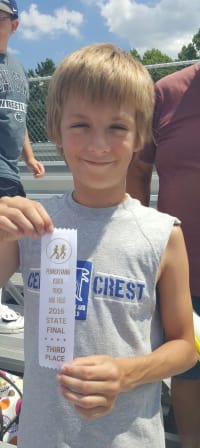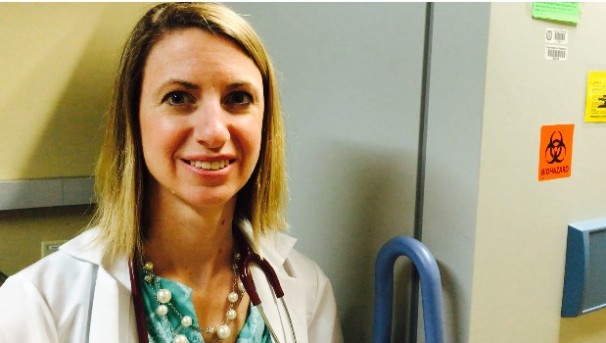This project is now in update mode. Check back regularly to see how things are progressing.
Freeze Out Pediatric Scleroderma!
Although their EngagePitt™ campaign has concluded, if you would still like to make a donation to support Pediatric Scleroderma research, you may always do so here.
-----------------------------------------------------------------------------------------
What is Scleroderma and the Pediatric Scleroderma Registry?
Pediatric onset scleroderma is a rare disease of uncertain cause, and includes systemic sclerosis and localized scleroderma (morphea, linear scleroderma, and eosinophilic fasciitis). Symptoms can include irregular, hardening, tightening, and/or itchy areas of skin, limited movement, as well as digestive, heart, lung, or kidney issues.
The Pediatric Scleroderma Registry (known formally as the National Registry of Childhood Onset Scleroderma, or NRCOS) at the University of Pittsburgh collects clinical information and blood samples from children living with scleroderma. The Pediatric Scleroderma Registry provides a unique opportunity for researchers to study a variety of aspects of the disease, from how a child’s immune system is functioning to their quality of life, and will ultimately help us to learn more about the disease as we work to improve treatment and outcomes.

Dr. Torok with one of her patients, Caitlyn, who visits the University of Pittsburgh Scleroderma clinic several times a year from California for localized scleroderma evaluation and management.
What is our goal?
Our overall goal is to #stopscleroderma in the early stages. Studying and understanding key immune elements over the course of the disease will help us find better treatments and give children a better quality of life. This requires a large number of pediatric scleroderma patients with clinical information linked to blood samples that are stored in specialized, ultra-low temperature specimen freezers.
We are running out of space in our current freezer and are reaching out to raise money for a NEW FREEZER so that we can continue to collect these precious samples. The total cost of a new freezer is $15,000, and we are initially hoping to raise $7,500 to defray this cost. Watch our video to learn more!
Dr. Torok with our current, extremely full, freezer.
How can you help?
With your support, our Pediatric Scleroderma Registry research team will be able to purchase a new freezer to store additional blood samples, which will help us study the disease. Ultimately this will help us find better treatments for pediatric scleroderma and give children a better quality of life.
100% of your tax-deductible donation will be used to purchase:
• a high-capacity ultra-low temperature freezer
• sample storage supplies including vials, boxes, and organizers
• liquid nitrogen to cool the cryogenic storage chamber
Thanks for supporting our efforts to #stopscleroderma!
Preston's Story

"Preston is a vibrant 10 year old with localized scleroderma since infancy. When he was 12 months old we noticed a hard discolored patch on his left leg. After years of seeing multiple doctors and undergoing testing, including a muscle biopsy, he was found to have localized scleroderma by age 3. Preston’s scleroderma affects both legs and runs deep down into the fat and tendons causing stiffness and decreased range of motion in his joints; especially his knees, ankles and feet. We never thought Preston would be able to participate in competitive sports. We are glad that we were wrong! With medications and intensive physical therapy over the years (both at the PT center and daily at home), we were able to halt the disease and gain some range of motion. In addition to the joint stiffness, he later developed arthritis in his hands at age 8, which required an additional medicine.
Fortunately, he has responded well and was just seen this summer by Dr. Torok and deemed in remission of both the scleroderma and arthritis. The ultimate highlight that he has overcome challenges associated with scleroderma is that he just came in 3rd in the 4 x 100 relay for his age group for the entire state of Pennsylvania at the finals of the PA Youth Track and Field Program this summer! We are so very proud of him. Preston is definitely winning the fight against scleroderma. We are so thankful to Dr. Torok and her team for assisting us through this journey with Preston, adding fun and optimism along the way."
-Preston’s parents: Tom & Emily Barton
Alyssa's Story
"My journey started when my mother noticed my hands turning blue/purple at a restaurant. My family began to notice my hands consistently changing color after that, which worried all of us. I went to the  doctor to get checked out and was referred to Dr. Torok, a pediatric rheumatologist at the University of Pittsburgh and Children’s Hospital of Pittsburgh. I was scared that I had a more serious problem. At my appointment I learned that my hands changing color was a sign of Raynaud’s phenomenon, and Dr. Torok collected my blood to confirm if my symptoms were a result of scleroderma. It turns out that the color change in my hands was the first symptom of systemic scleroderma.
doctor to get checked out and was referred to Dr. Torok, a pediatric rheumatologist at the University of Pittsburgh and Children’s Hospital of Pittsburgh. I was scared that I had a more serious problem. At my appointment I learned that my hands changing color was a sign of Raynaud’s phenomenon, and Dr. Torok collected my blood to confirm if my symptoms were a result of scleroderma. It turns out that the color change in my hands was the first symptom of systemic scleroderma.
Since my diagnosis I have had many other symptoms including digital ulcers on my fingers, shiny areas of skin, and darker areas of skin. My family and I have been committed to helping to find a cure for this rare disease, and have done multiple fundraisers to raise awareness and funds for research. One fundraiser was a raffle of a beautiful quilt that my grandmother made. Even my school showed awareness of my disease when they held a “glove day” in which you donated $1 to wear gloves to school for the day.
Recently I have been donating my blood to Dr. Torok’s research group through the National Registry for Childhood Onset Scleroderma (NRCOS). My disease has limited me in some ways physically, but I feel great that I am part of the research to find a cure and #stopscleroderma!"

Alyssa Finney and her grandmother, Cindy Garbor, created a teal scleroderma themed quilt for a raffle that raised funds for pediatric scleroderma research.
Carly's Story

“My story begins almost 4 years ago when I noticed that my hands were not working properly. My mother also noticed that my arms felt hard and waxy. I went to see my family doctor who ran several tests and referred me to Dr. Torok at the University of Pittsburgh and Children’s Hospital of Pittsburgh. My family and I traveled to Pittsburgh unsure of what would happen there and what the outcome would be. We met with Dr. Torok and she diagnosed me with localized scleroderma. She spent a lot of time with me and my family, and explained the treatments and medications needed to help me. After leaving the appointment I knew it would be a long, hard process to recover from scleroderma. With the help of Dr. Torok, my family and I were determined to beat this disease, and I did! I am almost back to normal function and am able to participate in activities and sports that I love. Since my diagnosis I realized that although scleroderma is not a well-known disease, it still affects many people and changes their lives, like it has mine. My family, friends, school, and even my parents’ workplace have held fundraisers to support pediatric scleroderma research. Please join us to raise awareness and help to #stopscleroderma.”

Carly Bankovich presenting a check Dr. Torok from her school's Penny Wars fundraiser for pediatric scleroderma research.
$5
Chill
It's getting cold! Many kids with scleroderma experience Raynaud's phenomenon and are very sensitive to cold temperatures. Your contribution will help our efforts to to find better treatments and improve their quality of life.
$10
Frost
Our specimens need to stay frosty to remain stable for research. Your donation will help us collect more specimens that are essential for innovative pediatric scleroderma research.
$25
Snowflake
A single snowflake often signals more is on the way! Your contribution will help us study how the smallest changes in the immune system signal improvement or flares of scleroderma.
$50
Flurry
It takes many snowflakes to make a flurry! Scleroderma is a complex condition with many forms and symptoms. Your contribution will help us gain understanding of these complexities and develop new treatments.
$100
Snowball
Here in Pittsburgh, many kids enjoy a good snowball fight. Kids with scleroderma have immune systems in constant battle with the disease. Your contribution will help us discover indicators of flares so that we can treat aggressively and minimize symptoms.
$250
Icicle
There are not many things colder than an icicle, except the freezer we hope to purchase! This special freezer has a temperature of -80 degrees Celsius (-112 degrees Fahrenheit), which is close to the coldest temperature ever recorded on earth. This temperature keeps our precious blood samples stable for cutting-edge research.
$500
Snowstorm
Snowstorms often arrive without warning and the same is true for pediatric-onset scleroderma. The Pediatric Scleroderma Registry also collects blood from healthy individuals to understand differences in the blood and immune system. Your contribution will help us to develop new methods of diagnosing scleroderma faster and easier.
$1,000
Blizzard
Blizzards make a BIG impact, and so can you! Contributions at this level will support our efforts to #stopscleroderma and have a positive impact on the lives of many kids for years to come!






